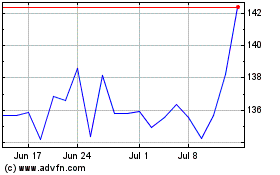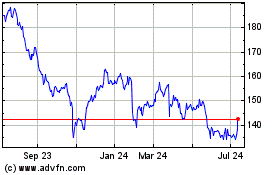By Paul Page
Sign up: With one click, get this newsletter delivered to your
inbox.
Amazon.com Inc.'s designs on the logistics world may not be as
grand as some delivery companies believe. Speaking at a conference
hosted by the technology website Recode, Amazon chief Jeff Bezos
played down the e-commerce giant's expansive moves to handle its
own distribution , the WSJ Heard on the Street's Miriam Gottfried
reports. Mr. Bezos says the goal is not to entirely replace
delivery from FedEx Corp., the U.S. Postal Service and, most
significantly, United Parcel Service Inc. but to "supplement it
heavily." Amazon's rapid expansion in distribution, including a
burgeoning network of distribution centers and new contracts for
aircraft capacity, is prompting big speculation in the market --
and fears that the company will siphon shipments away from freight
carriers. For now, Mr. Bezos says Amazon is building its business
with UPS and the Postal Service. What could keep that up? "Better
prices," he says.
Help for American steel makers is proving costly for other parts
of the economy. New tariffs helped push steel imports into the U.S.
down 29% in the first quarter, pushing a surge in surge in prices
charged by U.S. companies, the WSJ's John W. Miller reports. U.S.
Steel Corp., for instance, flexed its pricing power, raising its
base pricing for spot orders of some products by $60 per ton in
April. Now, the higher prices are rolling across the supply chain,
raising costs for manufacturers of goods ranging from oil pipes to
factory equipment to cars. U.S. steel makers are responding by
scaling up production, but global steel output is down and the
impact of lower inventories is being felt through the supply chain.
Average delivery times in the U.S. have increased to 6.2 weeks,
from 3.6 weeks when the year started, leaving factories to adjust
their schedules even as they handle the higher costs.
Germany may not be ready to turn part of its automotive supply
chain over to China. The country's economic ministry is putting
together a European offer for Kuka AG, which makes industrial
robots and automation technology, the Ruth Render and Christian
Grimm report. Kuka figures heavily in Germany's industrial economy,
counting 50% of its revenue from auto manufacturers and parts
suppliers. That's why China's Midea Group is bidding $5 billion for
the business, the latest move by Chinese buyers looking to acquire
engineering and technological know-how as they increase auto
production within China. It would be the biggest acquisition yet by
a Chinese company in Germany, and what critics believe is a step
too far. Still, some auto industry figures scoff at the concerns,
and it's uncertain whether German authorities can line up a
European counter-offer.
ECONOMY & TRADE
United Continental Holdings Inc. points to passenger demand
behind its new nonstop flights to second-tier cities in China, but
the real gain may be in the bellies of the planes. The airline will
start flying between San Francisco and Hangzhou and Xi'an, the
WSJ's Susan Carey reports, adding to United's operations to
Shanghai, Beijing and Chengdu. The Hangzhou flight will plug United
into an industrial city in the center of an expanding regional
manufacturing and logistics business built around technology
development, as well as the headquarters of e-commerce giant
Alibaba Group Holding Ltd. Cargo experts say United's 787 aircraft
will have room for cargo demand, and United can use the freight
boost. Its cargo revenue fell nearly 20% year-over-year in the
first quarter, and pricing has been falling in an airfreight market
that's been relatively stagnant in recent years.
The manufacturing sector is providing signs of progress even if
the signals of future growth remain faint. The Institute for Supply
Management's measure of factory activity in May ticked up from
April, the WSJ's Anna Louie Sussman reports, the third straight
month of expansion. The advance from March was slim, however, and
slipping indices for new orders, production and inventories all
suggest manufacturers still are advancing only fitfully amid tepid
global economic growth. Markit says a gauge of eurozone
manufacturing activity fell to a three-month low in May, although
that measure remained in expansionary territory. Factory conditions
in Japan hitting a three-year low in May, meantime, and China's
factory sector appears to be treading water. The best sign for U.S.
manufacturing may have been that the ISM's new orders index was in
expansion for the fifth straight month, suggesting some businesses
still believe demand will grow.
QUOTABLE
IN OTHER NEWS
Major auto makers reported declining sales in the U.S. in May.
(WSJ)
The Federal Reserve says in its "beige book" economic report
that labor markets are tightening across most of the U.S., pushing
up wages. (WSJ)
Reluctance among banks to finance deals in Iran is undercutting
attempts by Airbus Group SE to sell planes to Iran Air. (WSJ)
Uber Technologies Inc. has raised $3.5 billion from the
investment arm of Saudi Arabia. (WSJ)
Lands' End Inc. swung to a loss last quarter, dragged down by a
7.1% decline in same-store sales and aggressive discounting.
(WSJ)
Under Armour Inc. says liquidation sales at Sports Authority
Inc. will cut into its own sales this year. (WSJ)
Tesla Motors Inc. co-founder Elon Musk, facing delayed delivery
of the new Model X SUV, plans to revolutionize efficiency at
factories. (Los Angeles Times)
California lawmakers want to slow efforts to allow easier export
of coal through the Port of Oakland. (San Francisco Chronicle)
Alibaba told vendors on its TMall site to stop selling medicine
because of an "urgent" regulatory directive. (Reuters)
A coalition of U.S. Great Lakes ports, ship operators and
maritime groups filed a lawsuit challenging the Coast Guard's 2016
increase in pilotage rates. (Crain's)
Shipbuilder Hyundai Heavy Industries laid out a $2.94 billion
restructuring plan that would include asset sales and workforce
reductions. (Korea Times)
Amazon expects to hire 1,000 workers at its new distribution
center in San Marcos, Texas, between Austin and San Antonio.
(Austin American-Statesman)
BNSF Railway Co. is eliminating 62 management jobs as it
restructures operations amid the downturn in coal shipping.
(American Shipper)
Volvo Trucks expects to lay off more workers at its Dublin, Va.,
plant because of diminishing truck orders. (Commercial Carrier
Journal)
German ship operator Rickmers Linie took over the project cargo
business of Nordana Project & Chartering. (Marine Link)
Hong Kong-based Kerry Logistics completed its acquisition of
U.S. provider Apex Maritime. (LBR)
Warehouse equipment maker Bluff Manufacturing was acquired by
Wincove Private Holdings LP. (Modern Materials Handling)
The world's longest and deepest rail tunnel opened in
Switzerland. (BBC)
ABOUT US
Paul Page is deputy editor of WSJ Logistics Report. Follow him
at @PaulPage, and follow the entire WSJ Logistics Report team:
@brianjbaskin, @lorettachao, @RWhelanWSJ and @EEPhillips_WSJ, and
follow the WSJ Logistics Report on Twitter at @WSJLogistics.
Subscribe to this email newsletter by clicking here:
http://on.wsj.com/Logisticsnewsletter .
(END) Dow Jones Newswires
June 02, 2016 06:34 ET (10:34 GMT)
Copyright (c) 2016 Dow Jones & Company, Inc.
United Parcel Service (NYSE:UPS)
Historical Stock Chart
From Mar 2024 to Apr 2024

United Parcel Service (NYSE:UPS)
Historical Stock Chart
From Apr 2023 to Apr 2024
